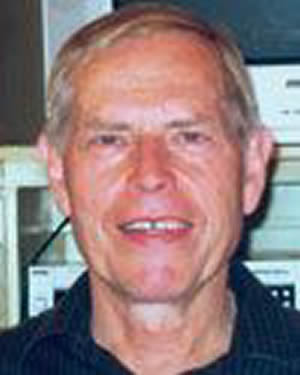Introduction to the Friendship Award
“The Friendship Award” is the People's Republic of China's highest award for foreign experts who have made outstanding contributions to the country's economic and social progress. Every year, 50 foreign experts are selected for the award, while 100 can qualify at certain anniversary celebrations. A total of 1,249 foreign experts, from 67 countries and regions have received the Chinese government’s Friendship Award, since 1991.
Up till now, altogether 11 foreign geoscientists recommended by the Chinese Academy of Geological Sciences were conferred on “the Friendship Award” due to their significant contributions to the development of geosciences in China.
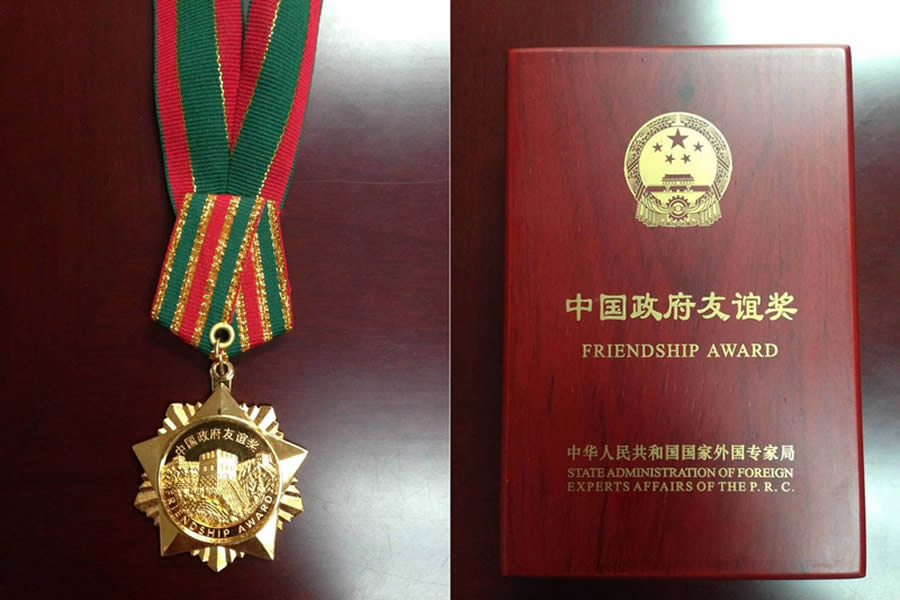
Winners of the Friendship Award Recommended by the Chinese Academy of Geological Sciences
Prof. Burrell Clark Burchfiel
Prof. Burrell Clark Burchfiel is an American structural geologist. Born in Stockton, California, he earned his Ph.D. in 1961 at Yale University. His first academic appointment was to the Geology Department at Rice University. He is the Schlumberger Professor of Geology at Massachusetts Institute of Technology (MIT). His research interests include origin, development, and structural evolution of the continental crust. His current work involves study of the geological history and evolution of the Tibetan plateau.
Prof. Burrell Clark Burchfiel was conferred on “the Friendship Award” in 2001.
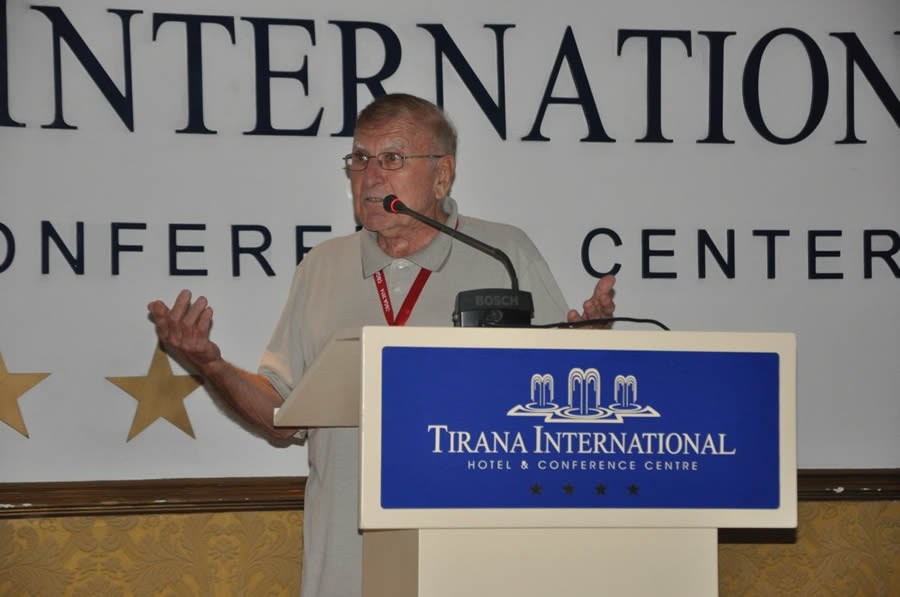
Prof.Paul Robinson
Prof. Paul Robinson from the Department of Earth Sciences, Dalhousie University, Canada has long been engaged in the research in ophiolites and oceanic lithosphere. He has worked on ophiolites in Oman, Cyprus, Canada, USA and China, including the diamond-bearing peridotites of Tibet and their podiformchromitites. He has accumulated rich experience through participation in a number of deep sea and ocean drilling programs.
Prof. Robinson has carried out long-term cooperation with the researchers from the Institute of Geology, Chinese Academy of Geological Sciences on mantle minerals in Tibet. Being a member of the China Continental Scientific Drilling Program, he has offered constructive suggestions for the successful operation of the program and given a lot of help in sample collection and analyses. His long-term cooperation with Chinese geologists has also produced a number of jointly published papers.
Prof. Paul Robinson was conferred on “the Friendship Award” in 1999.
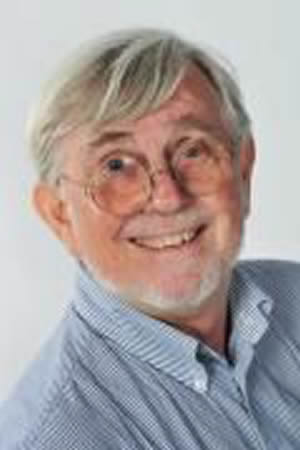
Prof. Paul Tapponnier
Prof. Paul Tapponnier from the Institute of Earth Physics of Paris is widely recognized as one of the foremost scientists of his generation in neotectonics. In 1998, Prof. Tapponnier worked with the Chinese research team led by Academician Xu Zhiqin from the Institute of Geology, Chinese Academy of Geological Sciences in conducting research on structural evolution in the middle Altyn Tagh Fault and eastern Kunlun Fault Zone in the northern Qinghai-Tibet Plateau.
After long-term collaborative research, they have developed a deeper understanding of the formation, evolution and extension mode of the Qinghai-Tibet Plateau and obtained great achievements in the fields of the slip rate, earthquake reoccurrence interval, deformation characteristics and tectonic evolution of large-sized strike slip faults since the Holocene in the northern Qinghai-Tibet Plateau.
Since 1998, over 20 papers have been jointly published by Prof. Tapponnier and the Chinese geologists, and 2 of the papers were published in Science. His efforts have not only pushed forward the study in the formation, evolution and uplifting of the plateau and the process of environmental change, but also helped enlarge the influence of Chinese geologists in the international geoscience community. Meanwhile, the collaborative research has significantly facilitated the capacity building for participating young Chinese geologists.
Prof. Paul Tapponnier was conferred on “the Friendship Award” in 1998.
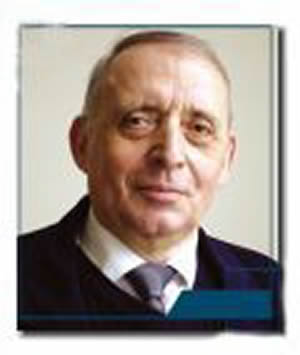
Dr. Sergey I. Andreev
Dr. Sergey I. Andreev currently serves as the Head of the Department for Geology and Mineral Resources of All-Russian Research Institute for Geology and Mineral Resources of the World Ocean (VNIIOkeangeologia) and a Corresponding Member of the Russian Academy of Sciences. Dr. Andreev has
long been devoted to the research in ocean polymetallic nodule and cobalt-rich manganese crusts. He has accumulated rich experience through participation in a number of ocean expeditions and carried out in-depth research in oceanic mineral resources.
Since 1992, Dr. Andreev has been active in promoting academic exchanges between the Institute of Mineral Resources, Chinese Academy of Geological Sciences and VNIIOkeangeologia. His efforts have greatly improved Chinese geologists’ knowledge of the up-to-date research developments in seabed metals, energy, seabed tectonics, deposits, geophysics, cobalt crusts samples and etc in the Russian and international geoscience communities.
Due to his important contributions to the investigation and study of oceanic mineral resources in China, Dr. Sergey I. Andreev was conferred on “the Friendship Award” in 2001.
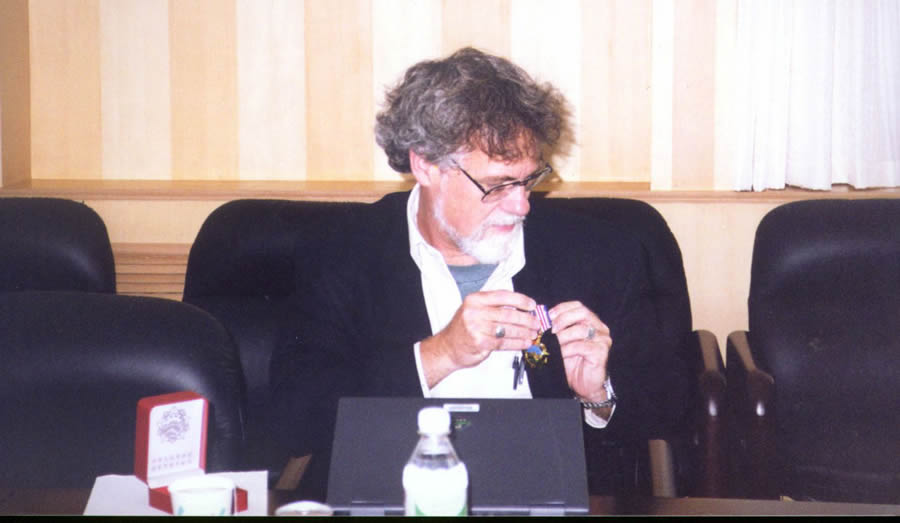
Prof. Larry Brown conferred on “the Friendship Award” in 2001
Prof. Larry Brown from the Department of Earth and Atmospheric Sciences, Cornell University is a prestigious geophysicist long been engaged in deep seismic investigations. After earning Ph.D. in geological sciences in Cornell in 1977, he has been participating in Consortium for Continental Reflection Profiling (COCORP) programme in Cornell and many major international projects in deep seismic investigations. Prof. Brown is a Fellow of the Geological Society of America and a Member of the American Geophysical Union, the Society of Exploration Geophysicists, and the European Geosciences Union. He once served as the Vice-President of the International Lithosphere Program (ILP) and editor of Acta Geoscientica Sinica.
Prof. Brown has contributed significantly to promoting substantial exchanges and comprehensive cooperation between Chinese and American geoscience communities in deep seismic investigations of Qinghai-Tibet Plateau. He has been one of the leading American scientists in collaborating with Academician Zhao Wenjin from the Chinese Academy of Geological Sciences to have successfully carried out “the International Deep Profiling of Tibet and the Himalayas (INDEPTH) Programme” and played a key role in the operation of the project. The project has obtained a series of new findings and important achievements, and greatly promoted multilateral scientific and technological exchanges and cooperation among the geologists and geophysicists from China, America, Germany and Canada participating in the project.
Prof. Larry Brown was conferred on “the Friendship Award” in 2001.
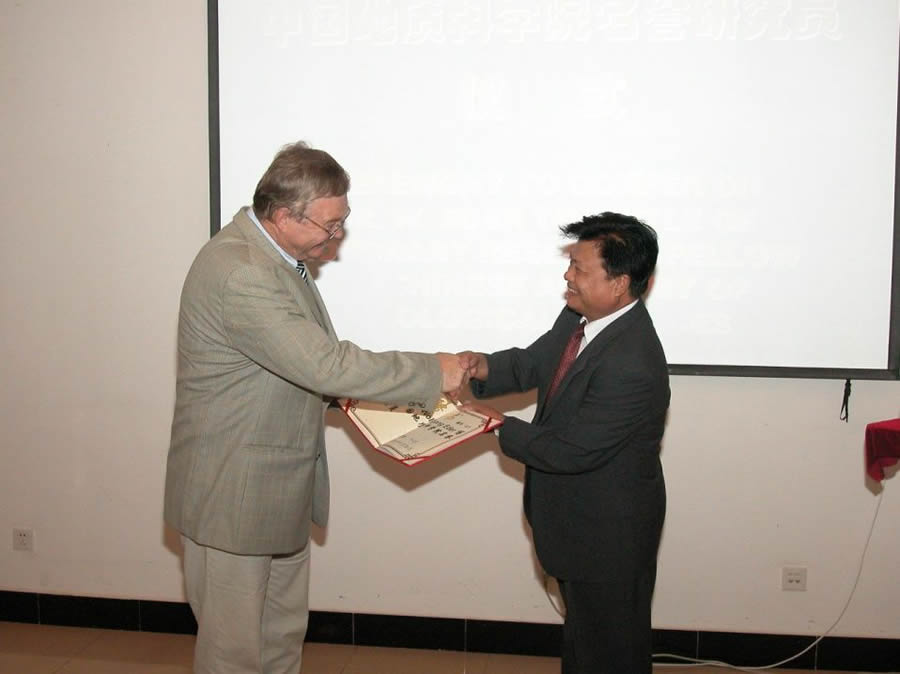
Prof. Meng Xianlai, President of Chinese Academy of Geological Sciences (CAGS), confers on Dr. Wolfgang Eder the title of the CAGS Honorary Research Fellow in 2005
Dr. Wolfgang Eder is a senior advisor to the Global Geopark Network. He served as the Director of UNESCO’s Division of Earth Sciences and Secretary of the International Geoscience Program (IGCP) from April 1992 to December 2004.
During his term as the Director of UNESCO’s Division of Earth Sciences and IGCP Secretary, Chinese researchers altogether participated in 43 IGCP projects, accounting for 41.7% of the total on-going IGCP projects during that period of time, and the number of IGCP projects with Chinese geologists as Leaders or Co-leaders increased by a large margin to 20 (9 as Leaders and 11 as Co-leaders). In February 2004, Dr. Eder presided over the 32nd Session of IGCP Scientific Board, at which a decision was made to give unanimous support for the establishment of the International Research Center on Karst in Guilin, China.
Meanwhile, Dr. Eder helped introduce the concept of geoparks to China in the 1990s and rendered great support for the construction and development of Geoparks in China. He carried out a number of on-site investigations to aspiring Chinese geoparks and put forward valuable suggestions on the planning and sustainable development of geoparks from the geoscientfic perspective.
Dr. Wolfgang Eder was conferred on “the Friendship Award” in 2005.
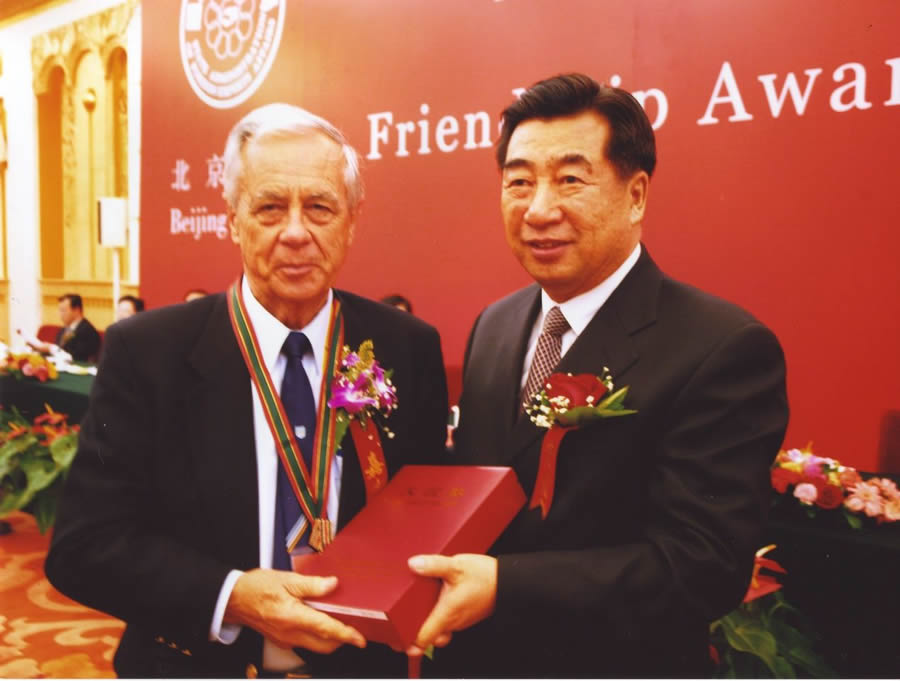
Chinese Vice Premier Hui Liangyu confers on Prof. William Compston “the Friendship Award” in 2006
Prof. William Compston from the Australian National University is a world-renowned isotope geologist. Being a pioneer in the research on isotopic geochronology, the techniques of isotopic geology and the development of mass spectrometer, he designed Sensitive High Resolution Ion Microprobe (SHRIMP) and developed the new technique for SHRIMP U-Th-Pb zircon dating. He was elected as a Fellow of the Australian Academy of Sciences in 1971 and a Fellow of the Royal Society of London in 1987.
Prof. Compston has been very friendly and paid many visits to China in the past nearly three decades. He offered great help to Chinese geologists to carry out the research on isotopic geochronology and the techniques of isotopic geology, and sponsored a number of study tours for young geologists from Chinese Academy of Geological Sciences and other Chinese institutions to Australia. In particular, he introduced the SHRIMP dating technique to China and provided valuable guidance and suggestions for Chinese geologists in the establishment of the Beijing SHRIMP Center, which has now developed into a world-famous geochronology laboratory and a top isotope dating platform. The efficient operation of the Beijing SHRIMP Center has helped accelerate the development of geosciences in China.
Prof. William Compston was conferred on “the Friendship Award” in 2006.
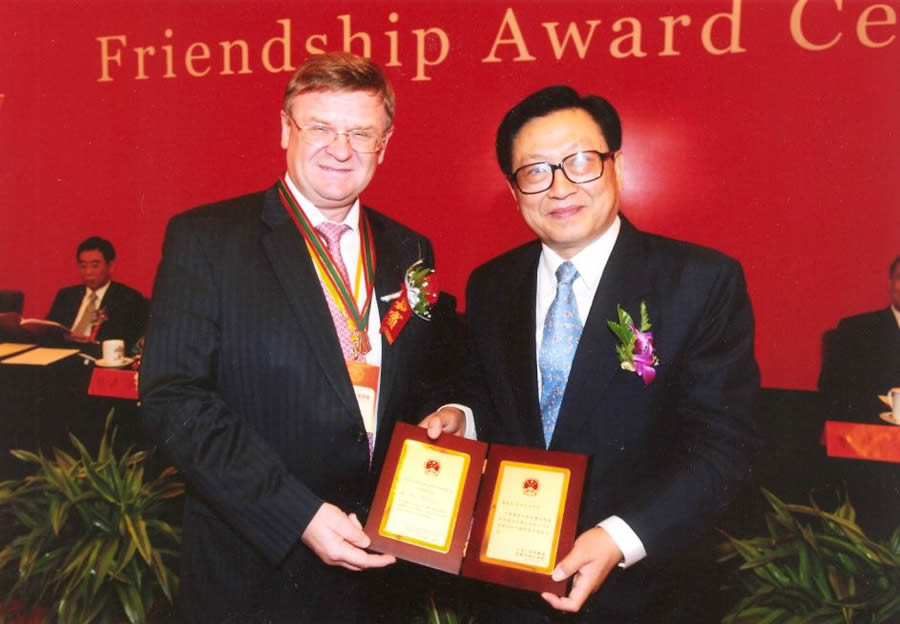
Chinese State Councilor Hua Jianmin Confers on Dr. Oleg Petrov “the Friendship Award” in 2007
Dr. Oleg Petrov is the Director General of A.P. Karpinsky Russian Geological Research Institute (VSEGEI), and serves as the Vice-President of the Subcommission for Northern Eurasia, Commission for the Geological Map of the World and Chairman of the Chief Editorial Board of the Ministry of Natural Recourses of the Russian Federation. Owing to his outstanding academic achievements, he won the title of Honoured Geologist of the Russian Federation.
Since he assumed the post of the Director General of VSEGEI in 1998, he has endeavored to advance cooperation between Chinese and Russian geoscientific communities. He actively promoted the rotating organization of “Seminars on Geology and Mineral Resources” during “the Year of Russia in China” in 2006 and “the Year of China in Russia” in 2007. He has been a key player and contributed a great deal to the initiation and implementation of “The Atlas of Geological Maps of the Central Asia and Adjacent Areas at 1: 2.5 M” (2003-2007) and “3D Geological Structures and Metallogeny of the Northern-Central-Eastern Asia” (2008-2013), joint international cooperation projects carried out by China, Russia, Mongolia, Kazakhstan, and South Korea. He facilitated the successful organization of the joint field excursion to Petropavlovsk-Kamchatsky, Norilsk and Irkutsk, Russia in 2010. Currently, CAGS and VSEGEI are implementing three Sino-Russian cooperation projects with frequent academic exchanges and rotating organization of joint field excursions.
Dr. Petrov was conferred on “the Friendship Award” in 2007.
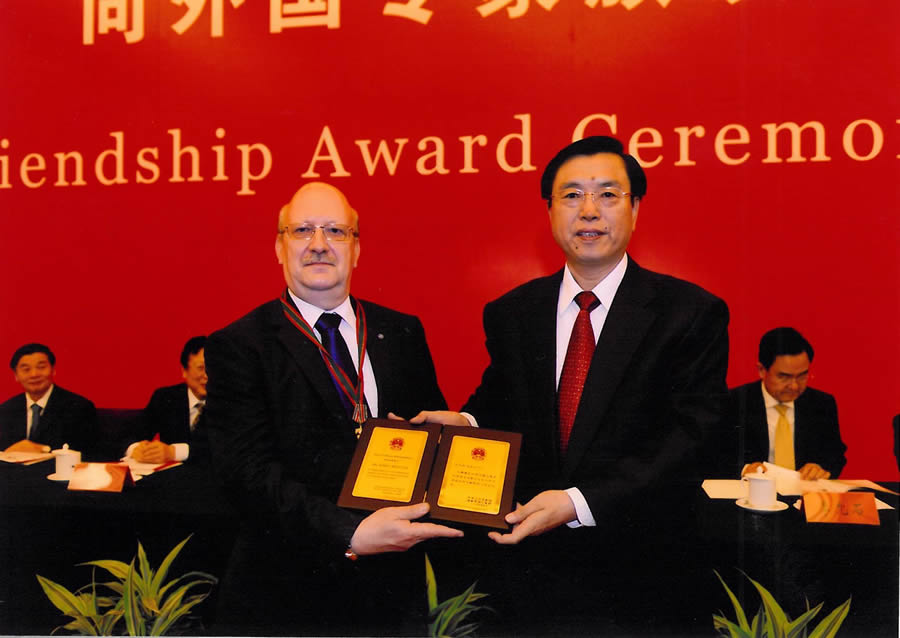
Chinese Vice Premier Zhang Dejiang Confers on Prof. Robert Missotten “the Friendship Award” in 2009
Prof. Robert Missotten once served as Chief of Global Earth Observation Section and Secretary of the International Geoscience Program at UNESCO. He has been devoted to helping developing countries, especially those in Africa and Asia with the application of remote sensing geology, construction of Geological Information System, geological electronic data processing and network management, evaluation of mineral resources and other relevant fields.
During his term of office as Chief of Global Earth Observation Section and IGCP Secretary at UNESCO, Prof. Missotten greatly supported China’s IGCP scientific activities, the approval and construction of the International Research Center on Karst (IRCK) under the auspices of UNESCO in Guilin, China, and the development of global geoparks in China. With his support, the number of Chinese geoscientists serving as the IGCP Scientific Board Members at the same time reached as many as 3, unprecedented in the IGCP history. He played a major role in and offered a considerable number of constructive suggestions for China’s successful application for the establishment of IRCK, the first UNESCO Category II Center in geosciences, and its smooth inauguration and operation afterwards. In addition, he actively supported the sustainable development of geoparks in China.
Prof. Robert Missotten was conferred on the “the Friendship Award” in 2009.
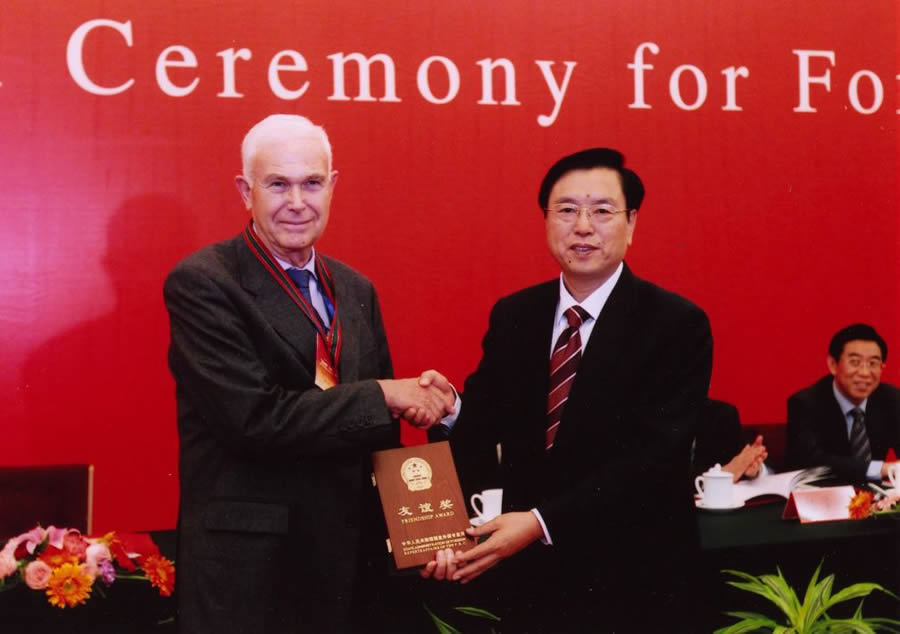
Chinese Vice Premier Zhang Dejiang Confers on Prof. Alfred Kr.ner “the Friendship Award” in 2010
Prof. Alfred Kr.ner from Johannes Gutenberg University of Mainz, Germany is an internationally outstanding geologist specializing in the research of Precambrian and early Palaeozoic crustal evolution.
He has carried out long-term and friendly cooperation with the Chinese geologists since the 1980s and greatly helped advance Chinese geologists’ research level in Precambrian geology by introducing updated research methods which closely combined petrology, metamorphic petrology, isotopic geochronology, and isotopic geochemistry. Prof. Kr.ner has been keen to introduce Chinese geologists and research institutions to the international geoscience community. As the Honorary Professor of the Beijing SHRIMP Center, Prof. Kr.ner has actively put forward suggestions to promote the development of the Center and helped shape and build “China International Precambrian Research Center (CIPRC)” affiliated to the Institute of Geology, CAGS.
Prof. Alfred Kr.ner was conferred on “the Friendship Award” in 2010.
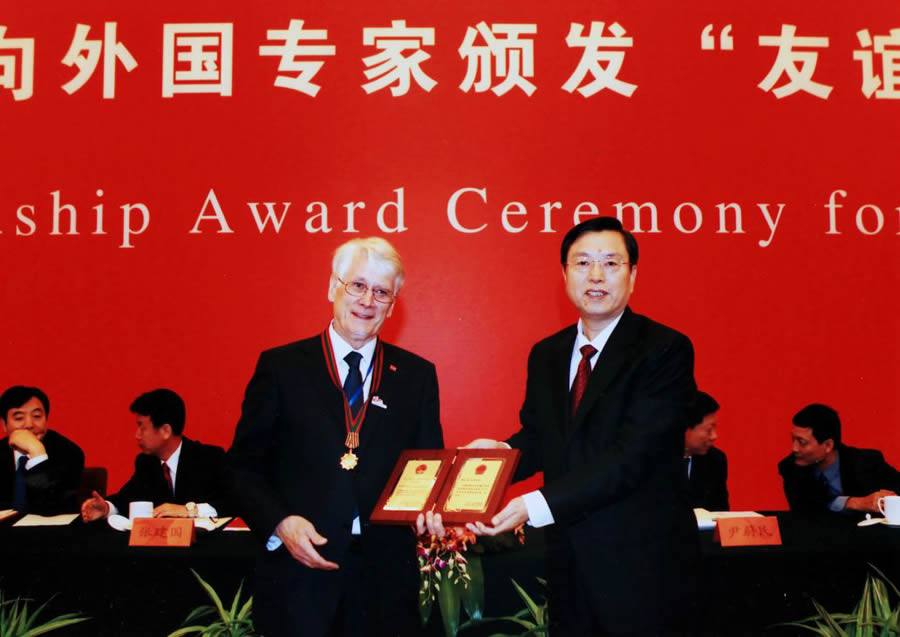
Chinese Vice Premier Zhang Dejiang Confers on Prof. Werner Müller “the Friendship Award” in 2011
Prof. Werner E. G. Müller from Johannes Gutenberg University Mainz is a world-renowned biologist and paleontologist. He has gained outstanding achievements in cytobiology, molecular biology and molecular bionics and made significant contributions to China’s research on sponge evolution, mineralization of siliceous sponge spicule and of the resulting bionic applications.
In recent years, Prof. Müller has conducted cooperative projects together with the researchers from the National Research Center of Geoanalysis, CAGS on mineralization mechanism of siliceous sponge spicules and their bionic applications. Among the jointly published papers, more than 30 are SCI research papers. Based on the successful bilateral collaboration, the German-Chinese Joint Lab of Bio-Nano-Composites, funded by the Federal Ministry of Education and Research of Germany, was established during the German-Chinese Year of Science and Education (2009/2010).
Prof. Werner E. G. Müller was conferred on “the Friendship Award” in 2011.

